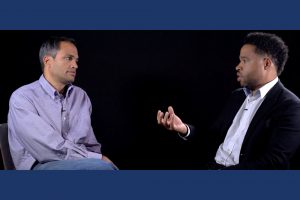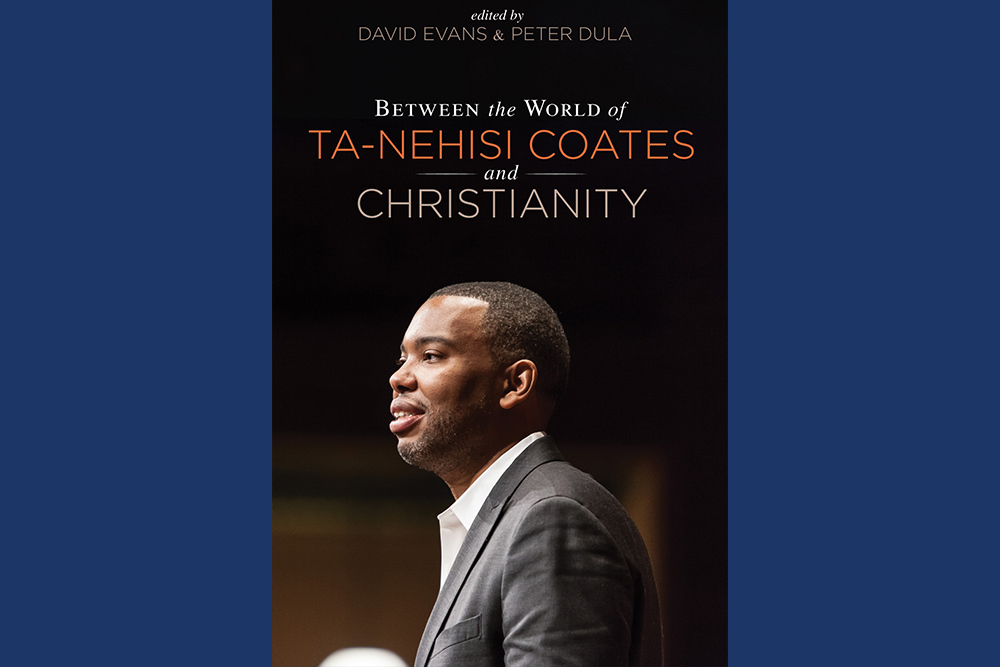A new book edited by Eastern Mennonite University professors David Evans and Peter Dula engages with author Ta-Nehisi Coates from a Christian perspective.
Between the world of Ta-Nehisi Coates and Christianity (Cascade, 2018) includes essays by theologians, ethicists and religious studies scholars responding to Coates’ Between the World and Me (Random House, 2015) on various topics, including hope, fatherhood and whiteness.
In his book, a National Book Award winner and the 2017-18 Common Read at EMU, Coates challenges readers to examine assumptions about race, history, education, faith and social change in a series of letters to his teenage son about his experiences as an African American male.

The book quickly became the topic of discussion across the nation, including a summertime conversation between Dula, department chair and professor of Bible and religion, and Evans, professor of history and mission at Eastern Mennonite Seminary. At that meeting they first discussed the possibility of creating such a volume, the duo recalls in a Wipf and Stock video about the book.
Just months later, Coates tweeted that “the best thing about between the world and me is seeing the engagement from Christians. Serious learning experience for me.” To Dula and Evans, that tweet felt like an invitation.
Although Coates writes in a spiritual way, he is an atheist and has a “reticence to engage fully in any kind of metaphysical reality,” Evans says in the video. “But it’s kind of there and wanting, and so we [Christian scholars] have something to say in the midst of that.”
Coates expresses direct criticisms of Christianity that are “not something that theologians like myself can ignore,” Dula says. For theologians to show a non-defensive eagerness to learn from Coates would be an opportunity to have “potentially really productive conversations.”
Their book, they say, is a model for engaging with Coates, which, as Evans observes, can be no easy task, in part since Coates doesn’t offer hope and comfort.
That, Dula adds, puts him in the company of Biblical prophets.
Contributors include:
- Cheryl J. Sanders, senior pastor of the Third Street Church of God in Washington, DC and professor of Christian ethics at the Howard University School of Divinity;
- Vincent Lloyd, associate professor of theology and religious studies at Villanova University;
- Jennifer Harvey, professor of religion and faculty director of the Crew Scholars Program at Drake University;
- Reggie L. Williams, associate professor of Christian ethics at McCormick Theological Seminary;
- Tobin Miller Shearer, associate professor of history, director of the African-American Studies Program at the University of Montana, and a 1987 graduate of EMU; and
- Joseph Winters, assistant professor of religious studies at Duke University with a secondary appointment in African and African-American studies.

I am so glad to see this sort of engagement spirit with Coates. I’m a White woman from the South, older than Coates, but with Black male and female friends from that time in high school who since have described their experiences in the world different from mine. I am 90% finished reading Coates’ book, BTWAM, and feel Coates immensely but also feel a sense of imprisoned doom in his analysis. He is indeed begging to be convinced he is wrong about his perpetual hopelessness, yet his truths are not untruths. We know this. But, I also kept looking for a higher consciousness to enter in, which has been a critical element of my own growth on the planet and I know unequivocally it is real. Yet, there is the struggle to stay aligned with the higher truths when the current reality keeps staring us in the face. Reparations are most immediately about releasing from bondage the slave mindset that has learned to imprison itself. And I felt the imprisonment of Coates’ mind–after feeling its capacity to fly beautifully and intricately unlocking multiple truths as well as much of his heart. I felt his deep pain over injustices that appear to have no dam and his mantel as a father deciphering the world to protect his son. Yet, for me, I also felt those critical locks on consciousness left locked. I have been in some similar “mindlocks” but when released of them have the flow of intuition, ideas and greater power is undeniable. Perhaps, Coates’ book can actually be seen as a prayer, in such exquisite detail, pain and concern out of such sincere desire to be a good steward on the planet, he is the first to ask so eloquently to be helped. By whom? By all of us who are capable of flowing in that higher consciousness energy to engage with Coates and help us all expand. God usually answers prayers through others after a person has struggled to be enlightened and find hope internal to themselves. I haven’t read your book yet, but am eager to. And I’m so grateful you have engaged. His capacity to share his world and create the question of hope and your engagement with him is an expansion of hope itself.